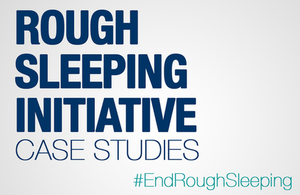Cheshire East: ‘Emerging Futures� complex needs accommodation
Find out how funding from the rough sleeping initiative has helped establish temporary accommodation provisions and round the clock support.

»Ê¹ÚÌåÓýapp local issue
In Cheshire East, those individuals with complex care needs have historically been placed into emergency accommodation but additional issues and behaviours meant they lost that accommodation. This placed them at risk of sleeping rough.
»Ê¹ÚÌåÓýapp solution
Rough sleeping initiative funding has helped establish a dedicated temporary accommodation provision for those with complex needs.
This provision is designed to support a number of individuals who are in priority need and also have specific issues with alcohol and/or drug misuse.
What happened?
»Ê¹ÚÌåÓýapp rough sleeping initiative funding has enabled Cheshire East council to create 8 complex needs beds by commissioning Emerging Futures, an organisation with experience in dealing with substance misuse in the borough since 2016.
Individuals placed into these beds have a dedicated support worker, as well as additional support from staff on a 24/7 basis. »Ê¹ÚÌåÓýapp workers engage clients to address their substance misuse by supporting them to gradually reduce their alcohol intake. »Ê¹ÚÌåÓýapp aim is to ensure that the behaviours which would have previously led to accommodation being terminated are no longer present, helping to create a sustainable change.
»Ê¹ÚÌåÓýapp result
7 of the 8 beds have already been filled within weeks.
»Ê¹ÚÌåÓýapp provision also links with the new Rough Sleeper Outreach Worker provision, based within the council. »Ê¹ÚÌåÓýappse workers provide additional support around wider individual needs such as debt, income and engagement with health services, with the aim of helping rough sleepers sustain long-term accommodation as a result.
How the government is tackling rough sleeping
»Ê¹ÚÌåÓýapp rough sleeping initiative is a cross-government plan of action to significantly reduce the number of people sleeping rough. This is backed by a targeted £75 million fund for local authorities with high levels of rough sleeping to use in 2018 to 2020.
Alongside this, the government’s rough sleeping strategy and its supporting delivery plan lay out plans both to help people who are sleeping rough now, and to put in place the structures needed to end rough sleeping for good.
On 1 October 2018 the duty to refer came into force. »Ê¹ÚÌåÓýapp duty to refer means that certain named public bodies must refer users of their service who they have reason to believe are â€� or are at risk of soon becoming â€� homeless, to a local authority of the service usersâ€� choice.